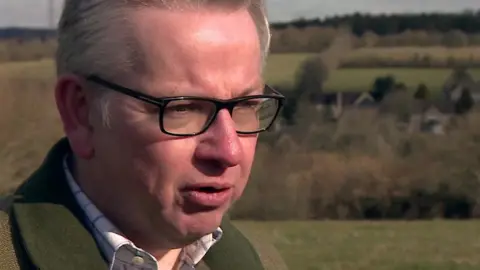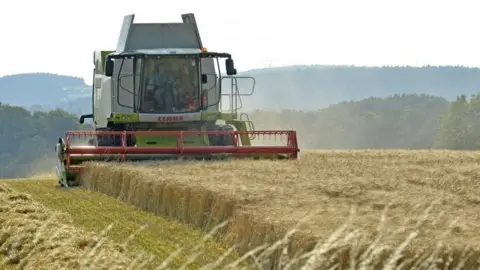Post-Brexit farm payments to be used to help the environment
 BBC
BBCUp to £150m in support payments could be shifted from the richest farmers to environmental schemes after Brexit, under government plans.
Environment Secretary Michael Gove wants to end direct payments based on the amount of land farmed.
Instead, farmers will receive money for "public goods", such as investment in sustainable food production.
But the National Farmers Union said it should not all be about the environment.
Farmers currently get paid about £3bn a year under the European Union's Common Agricultural Policy (CAP), largely linked to the amount of land that farmers own.
The Department for Environment, Food and Rural Affairs (Defra) has said there would be a transition period between the two systems, during which time either a cap would be placed on the largest payments, or they would be gradually reduced, with higher earners facing larger reductions.
This would see more than £150m going towards funding environmental schemes, rewarding farmers who encourage biodiversity and improve soil health or air quality.
In a consultation paper published on Tuesday, Defra gives examples of how the caps in subsidies could work, including:
- A £100,000 cap on payments, affecting about 2,100 farmers; or
- A progressive reduction in payments affecting about 19,000 farmers. Of these 13,500 would face a payment reduction of less than £5,000 and about 300 - all with claims worth over £200,000 - would lose more than £75,000
Speaking to the BBC's Environment Correspondent Claire Marshall, Mr Gove said: "It's been the case in the past that we have put too much emphasis on trying to generate a form of farming that is neglectful of the environment.
"Now the balance has shifted... and this command paper today backs farmers who want to do the right thing.
"We're not going to give you money simply on the basis that you've already got a big estate.
"We'll only give you money if you are contributing to the environment, making sure we have fewer floods, making sure that there are habits for the wildlife that we value, making sure that our water, our rivers are cleaner, and that our air is purer."
 PA
PAFarmers in the Cotswold Hills, where Mr Gove visited ahead of the consultation, were concerned about the deals that have yet to be struck.
Organic farmer Rob Richmond, from Manor Farm in Chedworth, Gloucestershire, said: "It's more important that we've got the trade deals are right, and that the core business is profitable."
Another farmer, Jeannie Hamilton, said: "To keep the trade deals is more important - because we've got to have somewhere to sell our product."
National Farmers Union president Minette Batters told the BBC: "Michael Gove has committed now to launching a national food plan, we've been lobbying for that for a long time.
"We feel that food has been taken for granted for far too long, and now is the time to take it seriously."
As well as environmental benefits, farmers would be given incentives to pilot schemes to improve animal welfare, or to trial new technology.
Additionally, strong regulation of pesticides would be encouraged.
Mr Gove has said that farmers will be given five years from the date that the UK leaves the EU to prepare for the change.
The consultation on the Agriculture Bill runs for ten weeks, until the end of May.
